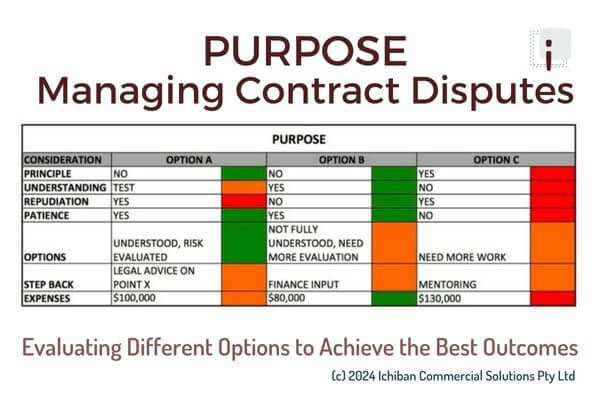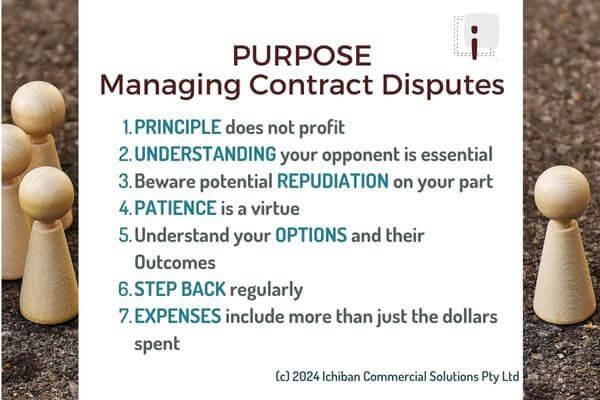7 Essentials for Purposefully Managing Contract Disputes
Managing contract disputes can take up lots of time, give you grey hairs and in the end, even when you come out as the winner, the time and money spent or the outcome often leaves a bitter taste in your mouth.
Therefore it is important to remember the purpose of why you are involved in any contract disputes and what you would like to achieve from it.
It is important to be very strategic in how you manage your contract disputes – similar to when you play a game of chess, in chess you:
- think ahead,
- plan your steps and often more important,
- understand what steps your opponent will take.
Purpose in Contract Disputes??? What am I talking about??
In a past life I practised law and litigated on behalf of my clients.
I saw all too often that when we decide to take a claim to dispute, it can be a long drawn out affair and when it is all over, there are no real winners. The clients that took someone to court “on principle” suffered the most.
From a procurement perspective, I also successfully managed a number of contracts and even the best laid out contracts can end up with claims.
The ones that went to dispute stage, took up a lot of time because of the number of people, time and resources involved and soon became a real pain in the back side.
Contract disputes provide no pleasure.
Sometimes you have no choice in your business to pursue it and take part in a contract claim.
However if you stop and step back often enough to reflect on the PURPOSE, you will work out how to best deal with this annoying pain in the back side.
PURPOSE
A mnemonic is a specific memory aid. In managing contract disputes PURPOSE is a useful mnemonic to remind you what and why you are in the midst of the process.
PURPOSE forms a useful step back tool for myself and my clients to use before commencing and during any contract disputes.
The acronym refers to:
- PRINCIPLE: there is no profit in litigation for principle;
- UNDERSTANDING: Work out why your opponent has an issue and what it will take to resolve this;
- REPUDIATION: be careful that your own actions do not create a potential breach of contract;
- PATIENCE: losing your cool will get you nowhere:
- OPTIONS: critically and objectively explore the options available to you and make fact based decisions;
- STEP BACK: beware not to be sucked into the fight and not take the time to evaluate where you are and want to be;
- EXPENSES: the cost of managing contract disputes is so much more than just external fees, remember the value of time.
#1. No profit in principle
You never start a fight or enter into any contract disputes on principle. Principle becomes an emotional affair and when we become emotional, we lose our ability to make rational business decisions.
Principle does not let you see the bigger picture and often you end up paying more than you would be gaining even when you win.
#2. Understanding your Opponent
Contract disputes require strategic thinking and if you do not know what your opponent thinks, requires, wants or is trying to gain, you will not know how to make the best strategic decision.
Also, you have to make sure that your opponent cannot read your strategy.
Therefore limiting the channels of conversation, is always a great idea.
One person should be the contact person for any dispute to ensure that your opponent does not try to “divide and conquer”.
#3. Repudiation
Repudiation of a contract occurs where one party “walks away” from a party’s obligations under a contract.
The principle revolves around the concept that parties to a contract
“should be ready, willing and able to fulfil their contractual obligations at the relevant time.”
When entering into any contract disputes, it is important to make sure that you do not act in any manner that will allow your opponent the opportunity to claim that YOU breached the contract and are not willing, ready and able to fulfil your contract obligations.
#4. Patience
The old saying:
“patience is a virtue”
applies to all contract disputes.
Notwithstanding how frustrated, impatient or angry you get, you should never show your opponent how angry you are or make any anger-based decisions. Count to ten.
When your opponent is a real pain in the back side, then make him/her more angry and frustrated than you are. At least that will provide you some entertainment.
#5. Options
Managing a dispute you really need to consider all your options and the potential outcomes for each of those options.
You have to look at the risks and the benefits of each option.
Then make an informed decision.
And not only do this before you enter into a contract dispute, but throughout the duration of the contract dispute – the options and outcomes will change over time.
One area where people do not define a real value and cost, is on the true cost of their time and often the time of all staff involved.
What else could you do and achieve in the time you spent on this contract dispute?
#6. Step back
Step back often enough during the process of managing your contract disputes to make sure that you are still on the right track. Also, seek expert advice for technical areas in order to understand any weaknesses in your contract and/or strategy.
It helps to make sure that you have a mentor on board to guide you, to be a sounding board and ask the difficult questions of what and why.
#7. Expense
Understanding the expenses involved in managing contract disputes, links in with understanding your options (#5. Options above), the outcomes and the total cost involved in each of those options.
It also means to understand the expense from a total cost perspective – including your time, your staff and management’s time.
Don’t forget the cost of getting your hair dresser to remove the grey from your hair. Now, that may be said in jest but even when you are in the right with your contract dispute, the process will give you grey hairs and leave you very frustrated at times.
In conclusion, remember your PURPOSE in managing contract disputes:
- Principle does not profit;
- Understanding your opponent is essential;
- Ensure your own actions do not create potential contract breach or Repudiation
- Patience is a virtue as contract disputes can often take quite long to find a mutually acceptable solution;
- Understand your Options and their Outcomes
- Step Back regularly, review and re-evaluate;
- Expense includes more than just the dollars spent.
Below is a really simplified example to give you an idea how you can use our PURPOSE mnemonic to evaluate your position on the different contract disputes options:

Please contact us if you have any questions on how to negotiate your contracts or manage any contract disputes. We know what it takes and have a few tips and tricks to reduce the number of grey hairs.
We also mentor procurement leaders and business owners and support you along the way.






